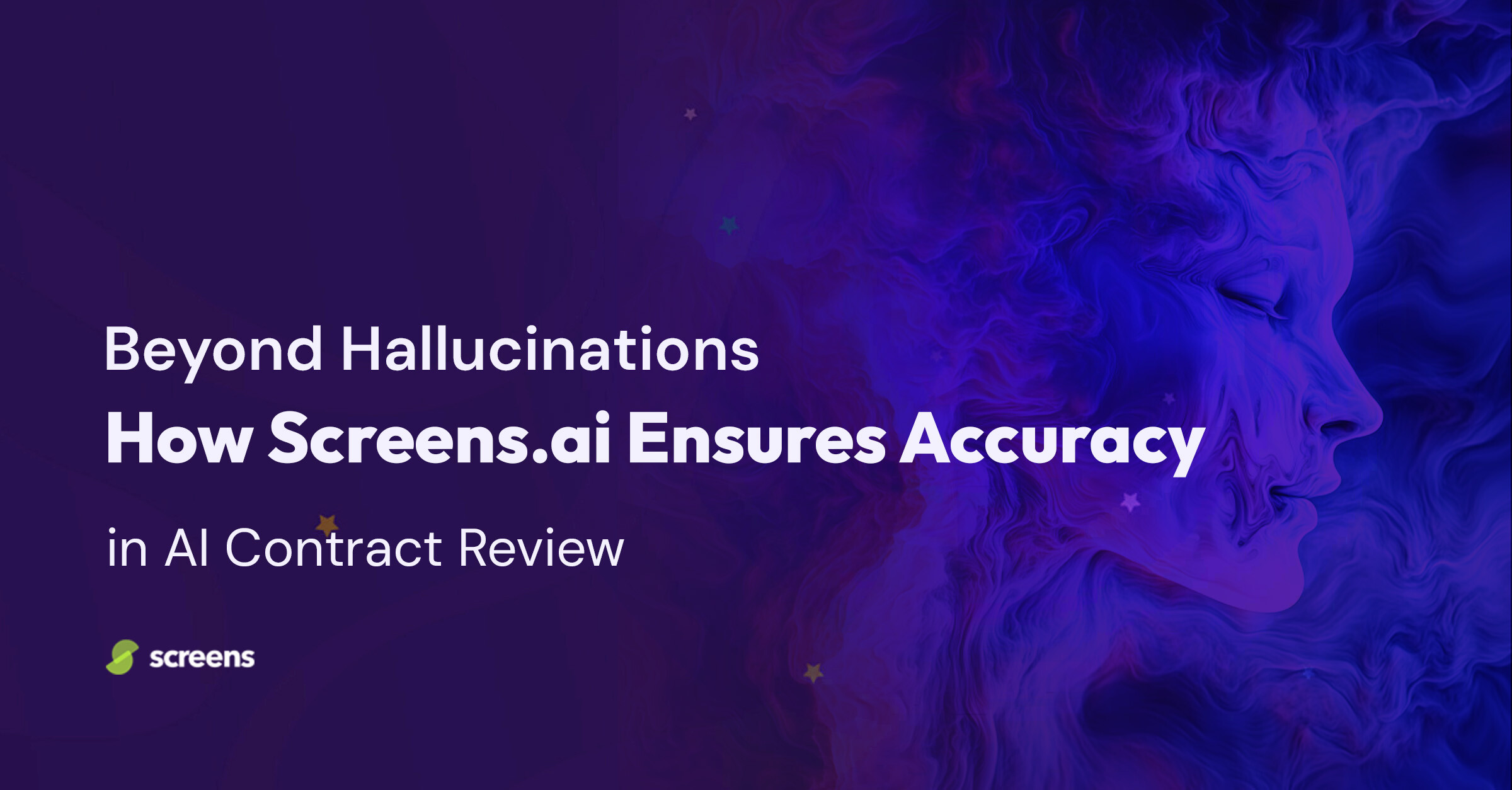Beyond Hallucinations: How Screens.ai Ensures Accuracy in AI Contract Review

AI Hallucinations in Legal Tech
As artificial intelligence continues to make inroads into the legal industry, concerns about the reliability and accuracy of AI-powered tools have come to the forefront. One of the most pressing issues is the phenomenon known as "AI hallucination," where AI systems generate false or misleading information that appears credible. For legal professionals, whose work demands utmost precision and accuracy, this issue is particularly alarming.
AI hallucinations occur when language models produce content that is factually incorrect or entirely fabricated, yet presented as truthful. In the legal context, this can have severe consequences. In 2023, a lawyer representing an airline passenger injured by a service cart inadvertently submitted a legal brief containing citations to non-existent court cases, which were fabricated by an AI chatbot. This incident led to significant consequences, including sanctions from the judge and damage to the lawyer's professional reputation.
What are hallucinations and why do they happen?
Hallucinations occur due to the nature of how AI models are trained and operate. Large language models are trained on vast amounts of text data, learning patterns and relationships between words and concepts. When generating responses, they use statistical probabilities to predict the most likely sequence of words based on the input and their training. However, this process can sometimes lead to the creation of plausible-sounding but entirely false information. Hallucinations can happen for several reasons:
- Lack of real-world knowledge: AI models don't have true understanding or reasoning capabilities, so they may fill in gaps with statistically likely but incorrect information.
- Overfitting or biases in training data: If the model's training data contains inaccuracies or biases, these can be reflected in its outputs.
- Misinterpretation of context: The AI might misunderstand the context of a query and generate irrelevant or incorrect information.
- Limitations in the model's ability to fact-check: Unlike humans, AI models can't verify the truthfulness of the information they generate against external sources in real-time.
Preventing Hallucinations
Screens.ai's approach to contract review is fundamentally designed to prevent hallucinations. Unlike AI systems that need to search vast external databases, Screens.ai focuses solely on the uploaded contract, eliminating the risk of fabricating information. The platform employs a principle called "auditability," which allows users to immediately verify the AI's work by accessing the relevant language in the contract. When presenting this source language, Screens.ai uses traditional software and algorithms rather than generative AI, ensuring that "the source language is incapable of being the subject or product of a hallucination", says Otto Hanson, founder and CEO. This approach not only prevents hallucinations but also builds trust by providing users with a clear, verifiable link between the AI's insights and the original document.
"The beautiful part about the problem we're solving is that the answer to a user’s question is always contained within the four corners of the documents the customer uploads. The AI never has to go out into an indeterminate corpus of case law in the world to try to summon the most relevant material." added Hanson. This approach fundamentally differs from systems that generate information based on vast, external datasets. Instead, Screens.ai focuses solely on the document at hand, ensuring that all information comes directly from the source material.
Building Trust Through Auditability
These audit features are crucial for legal professionals who need to verify the accuracy of AI-generated insights. By providing direct access to the source language in the contract, Screens.ai ensures that the source language is incapable of being the subject or product of a hallucination.
Audit features not only prevent hallucinations but also build trust with users. Legal professionals can quickly verify any AI-generated insights against the original document, providing a level of transparency and reliability that is essential in legal work.
This approach intentionally aligns with the growing demand for explainable AI in the legal sector. By allowing users to trace AI-generated insights back to their source in the original document, Screens.ai provides a clear audit trail. This transparency is crucial for legal professionals who need to understand and explain the reasoning behind any AI-assisted analysis.
As the legal industry continues to adopt AI-powered tools, it's crucial to understand the risks associated with AI hallucinations and the measures taken to prevent them. Screens.ai's approach of focusing solely on the uploaded contract and providing immediate auditability offers a model for how AI can be reliably integrated into legal workflows. By prioritizing transparency and verifiability, such tools can help legal professionals harness the power of AI while maintaining the accuracy and reliability that the legal profession demands.



